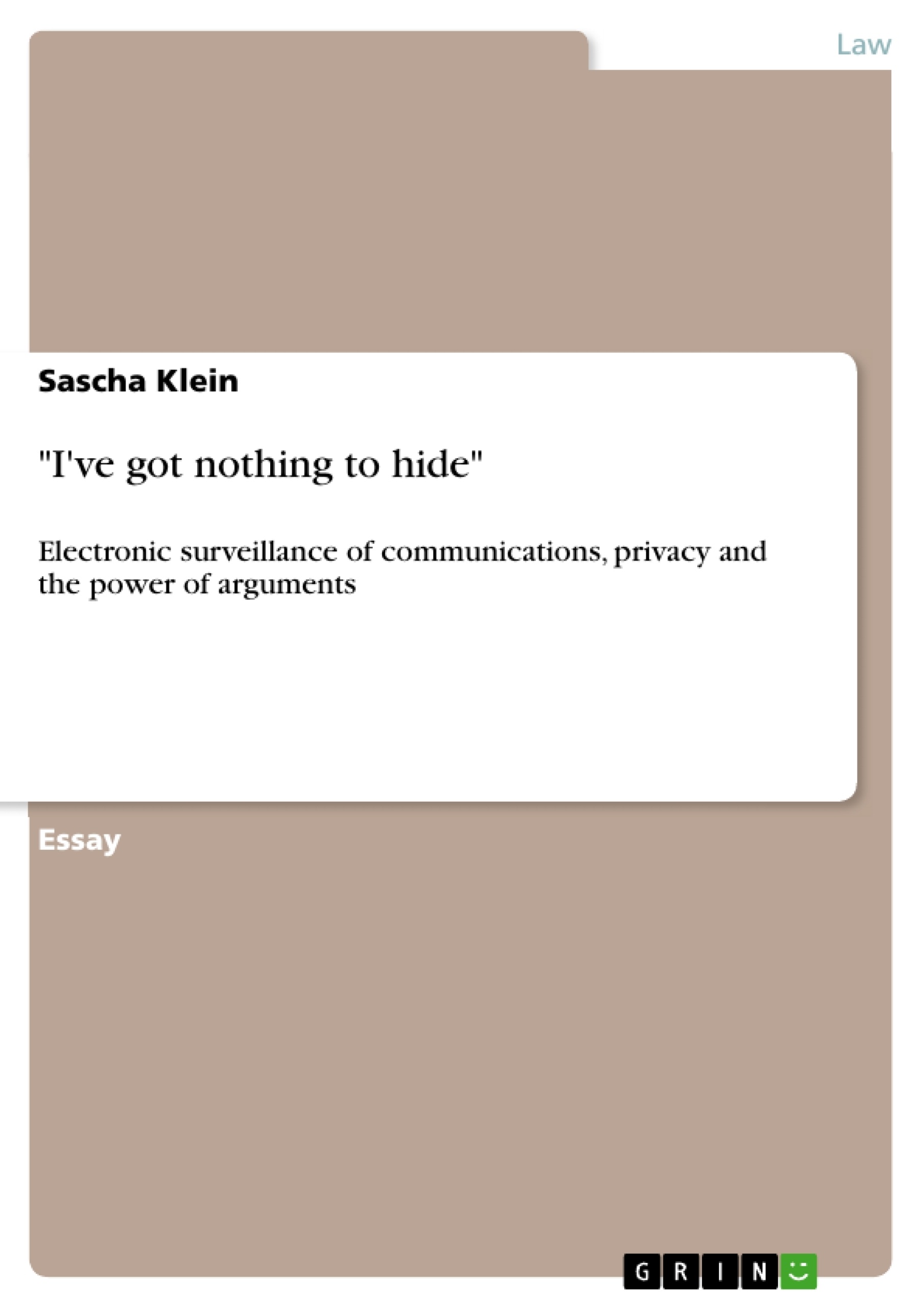During the so-called ‘War on Terror’ the citizen’s rights get more and more under pressure. The critics of this development are gaged with the argument ‘Who does not have something to hide, has nothing to fear’ . However there is a common understanding that there is a need of legal rules for acts of surveillance. In the context of Electronic Surveillance of Communications there has been a consideration if the collection of data and surveillance are consistent with the right of privacy apart from its legitimacy. Especially against the background that this is both a human right and a constitutional right.
Inhaltsverzeichnis (Table of Contents)
- I. INTRODUCTION - THE ISSUES IN BRIEF
- II. 'I'VE GOT NOTHING TO HIDE' AS A CHARTER FOR SURVEILLANCE
- III. The difFFERENT PERSPECTIVES ON THE DEFINITION OF PRAVACY
- V. SUMMARY
Zielsetzung und Themenschwerpunkte (Objectives and Key Themes)
This text examines the "nothing to hide" argument in relation to electronic surveillance and data mining, analyzing its implications for privacy rights. It aims to shed light on the complexities surrounding the debate by exploring various perspectives and the potential consequences of this seemingly straightforward argument.
- The "nothing to hide" argument and its impact on privacy
- The balance between national security and individual rights
- The different perspectives on privacy held by governments and citizens
- The role of legal frameworks in addressing privacy concerns
- The multilayer nature of privacy and its application in the digital age
Zusammenfassung der Kapitel (Chapter Summaries)
- I. INTRODUCTION - THE ISSUES IN BRIEF: This chapter introduces the "nothing to hide" argument in the context of electronic surveillance and data mining, raising concerns about the pressure on citizens' rights during the "War on Terror." It highlights the need for legal rules governing surveillance activities and explores the tension between privacy rights and data collection practices.
- II. 'I'VE GOT NOTHING TO HIDE' AS A CHARTER FOR SURVEILLANCE: This chapter delves into the "nothing to hide" argument, examining its persuasive power and its potential to undermine privacy considerations. It analyzes the argument's impact on legal practice and argues that it can be used as a justification for widespread surveillance.
- III. The difFFERENT PERSPECTIVES ON THE DEFINITION OF PRAVACY: This chapter explores the contrasting views on privacy held by governments and citizens. It examines the broader perspective on privacy adopted by governments in relation to national security and the more restrictive view held by individuals who emphasize the right to privacy as a fundamental human right.
Schlüsselwörter (Keywords)
The main keywords and focus topics of the text include: privacy, electronic surveillance, data mining, "nothing to hide" argument, national security, individual rights, legal framework, citizen rights, government surveillance, signal intelligence agencies, pattern-based data mining, false-positive and false-negative results.
Frequently Asked Questions
What is the "nothing to hide" argument?
It is the claim that "if you have nothing to hide, you have nothing to fear" from government surveillance.
Why is this argument criticized?
Critics argue it oversimplifies privacy, which is a fundamental human right necessary for freedom, regardless of whether one is committing a crime.
How does electronic surveillance impact privacy?
Mass data collection and data mining put pressure on constitutional rights and can lead to "false-positive" results where innocent people are flagged.
What is the government's perspective on privacy?
Governments often prioritize national security and the "War on Terror," viewing extensive data collection as a necessary tool for safety.
Is privacy a human right?
Yes, the text highlights that privacy is both a human right and a constitutional right that must be balanced against security measures.
- Citation du texte
- Dipl. jur. Sascha Klein (Auteur), 2012, "I've got nothing to hide", Munich, GRIN Verlag, https://www.grin.com/document/192766



